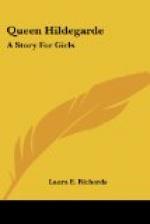“A-g, ag,” said the voice; “g-l-o-m, glom,—agglom; e-r er,—agglomer; a-t-e, ate,—agglomerate.” There was a pause, and then it began again: “A-g, ag; g-l-o-m, glom,” etc.
Hilda’s curiosity was now thoroughly aroused; and laying down her basket, she cautiously parted the leaves and peeped through. She hardly knew what she expected to see. What she did see was a boy about ten years old, in a flannel shirt and a pair of ragged breeches, busily weeding a row of carrots; for this was the vegetable garden, which lay behind the currant-bushes. On one side of the boy was a huge heap of weeds; on the other lay a tattered book, at which he glanced from time to time, though without leaving his work. “A-n, an,” he was now saying; “t-i, ti,—anti; c-i-p, cip,—anticip; a-t-e, ate,—anti_cip_ate. ’To expect.’ Well! that is a good un. Why can’t they say expect, ’stead o’ breakin’ their jawsen with a word like that? Anti_cip_-ate! Well, I swan! I hope he enjoyed eatin’ it. Sh’d think ‘t’d ha giv’ him the dyspepsy, anyhow.”
At this Hilda could contain herself no longer, but burst into a merry peal of laughter; and as the boy started up with staring eyes and open mouth, she pushed the bushes aside and came towards him. “I am sorry I laughed,” she said, not unkindly. “You said that so funnily, I couldn’t help it. You did not pronounce the word quite right, either. It is an_ti_cipate, not antic_ip_-ate.”
[Illustration: “SHE PUSHED THE BUSHES ASIDE AND CAME TOWARDS HIM”]
The boy looked half bewildered and half grateful. “An_ti_cipate!” he repeated, slowly. “Thanky, miss! it’s a onreasonable sort o’ word, ’pears ter me.” And he bent over his carrots again.
But Hilda did not return to her currant-picking. She was interested in this freckled, tow-headed boy, wrestling with four-syllabled words while he worked.
“Why do you study your lesson out here?” she asked, sitting down on a convenient stump, and refreshing herself with another bunch of white currants. “Couldn’t you learn it better indoors?”
“Dunno!” replied the boy. “Ain’t got no time ter stay indoors.”
“You might learn it in the evening!” suggested Hilda.
“I can’t keep awake evenin’s,” said the boy, simply. “Hev to be up at four o’clock to let the cows out, an’ I git sleepy, come night. An’ I like it here too,” he added. “I can l’arn ’em easier, weedin’; take ten weeds to a word.”
“Ten weeds to a word?” repeated Hilda. “I don’t understand you.”
“Why,” said the boy, looking up at her with wide-open blue eyes, “I take a good stiff word (I like ’em stiff, like that an—an_ti_cipate feller), and I says it over and over while I pull up ten weeds,—big weeds, o’ course, pusley and sich. I don’t count chickweed. By the time the weeds is up, I know the word, I’ve larned fifteen this spell!” and he glanced proudly at his tattered spelling-book as he tugged away at a mammoth root of pusley, which stretched its ugly, sprawling length of fleshy arms on every side.




